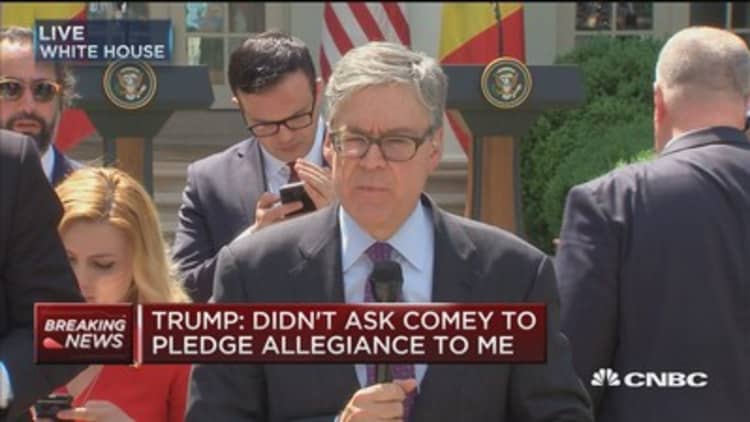
"I travel this state every day," a Republican senator declared recently, "and I haven't yet had anybody come up to me and say they're worried about Russia messing with our elections."
Comments like that, from Sen. Luther Strange of Alabama, bolster the idea that President Donald Trump enjoys an unbreachable shield from fellow Republicans as Congress and a Justice Department special counsel conduct their investigations on Russia's interference in the 2016 presidential race. So do his 80-plus-percent approval ratings from rank-and-file party members nationwide.
Trump's partisan shield is indeed strong. Fellow Republicans who control Congress see him as an ally for their legislative goals and fear angering his loyal supporters. They can deflect political heat from the investigations and control whether scattered calls for Trump's removal from office ever turn into an impeachment process.
And partisanship itself holds more power than it has since World War II. Over decades the two major parties have grown almost ideologically homogenous, as conservative Democrats shifted to the GOP and liberal Republicans became Democrats. Even as immigration makes the nation more diverse, barriers of ideology, race and bitter partisanship reinforce divisions between the two sides.

But that doesn't make Trump invulnerable, even within his own party. Republican senators on the Intelligence Committee Thursday did not dispute the veracity of former FBI Director James Comey as he described the president as a liar who fired him to influence the Russia investigation. Chairman Richard Burr, a Republican, praised Comey as "somebody that loves this country enough to tell it like it is."
Among rank-and-file Republicans, Trump's support has lately declined slightly. In the most recent Gallup weekly averages, 82 percent approve of his performance, down from the 89 percent he notched as he came into office.
And recent history shows that gradual intraparty erosion can foreshadow the crumbling of once-commanding political positions. In the year after the June 17, 1972, Watergate break-in, for instance, President Richard Nixon's support among fellow Republicans declined by 7 percentage points to 76 percent as televised hearings into the matter got underway.
That Trump maintains a higher standing among Republicans now than Nixon did holds little significance in light of how the parties have changed. Thanks to conservative Democrats, Nixon then enjoyed the approval of 27 percent of the opposition party, compared to Trump's 7 percent today.
Overall, one year into the Watergate scandal, Nixon's approval rating stood at 44 percent. Fewer than five months after taking office, Trump's stands at 38 percent.
The geographic contours of Trump and Nixon's resistance and support contain significant overlap.
Among the few Republicans on the House Judiciary Committee to vote for Nixon's impeachment in 1974 was then-Rep. William Cohen of Maine. Susan Collins, an intern for Cohen that summer, is now a Republican senator from Maine who said Friday she gives credence to Comey's sworn testimony.
Trump's support in Deep South states like Strange's Alabama, which he carried with 62 percent of the vote, mirrors that of Nixon, who carried it with 72 percent. The difference is that Alabama conservatives then were mostly Democrats, most famously then-Gov. George Wallace.
In June 1974, two years after the Watergate break-in, the band Lynyrd Skynyrd released a song called "Sweet Home Alabama" that became a Top 10 hit. "Watergate does not bother me," went one lyric, "does your conscience bother you?"
Six weeks later, after the release of what became known as the "smoking gun" Oval Office tape recording, Nixon saw his staunchest support begin to collapse. He announced his resignation on August 8.
Watch: Trump willing to testify under oath on Comey testimony



